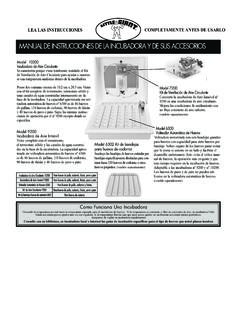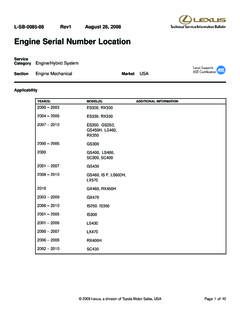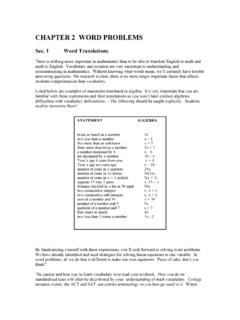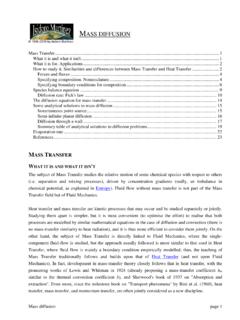Transcription of 2-Cycle Engine 40:1 Mixture Ratio Information - Yahoo
1 2-Cycle Engine 40: 1 mixture ratio information Unlike four- cycle engines that have a separate oil reservoir for lubricating the Engine , two- cycle engines are lubricated through the combustion cylinder by mixing specially formulated oils with the fuel. Running a 2-Cycle Engine with the wrong gas/oil Mixture will seriously damage your equipment, and running one without any oil in the fuel will completely destroy your pump's Engine in seconds. How Long Does Gasoline Keep? Using "new" gasoline in a gas-powered Engine is not necessarily the same as using fresh gasoline. The gas that just came out of the gas-can might be new to the Engine but if it has been stored for three to six months it might not be fresh.
2 Old gasoline will break down and lose its full potency and will reduce the power output of your pump's Engine and can cause excessive impurity build-up in the Engine 's parts. Tips for proper gasoline storage and use: Discard gasoline after storing it for three to six months. If you store your gas-powered pump with fuel inside the gas tank, use a fuel stabilizer to protect the Engine 's carburetor. Even if you use a fuel stabilizer when you store your Engine , discard the gasoline at the start of the next season. The stabilizer is only there to keep the carburetor from drying up. If you're determined to store gasoline for long periods of time, use a fuel stabilizer. Fuel stabilizer can extend the life of stored gasoline up to several more months.
3 PAC-25 Oil/Gas 40:1 Mixture Ratio Every 2-Cycle Engine has a specific gas/oil Mixture Ratio ; the Pacer PAC25 Engine pump has a 40:1. Mixture Ratio . This 40:1 gas/oil Ratio is displayed on side of the Engine 's gas tank. There are 128 ounces in one gallon, so divide the 128 by 40 and that will give you the number of ounces of 2-Cycle oil you need for one gallon of gasoline. You will need ounces of oil for every gallon of gasoline for a 40:1. Mixture Ratio . Commercially Available Pre-measured oz Engine Oil Bottles Troy-Bilt oz Engine oil 2 cycles 40:1 at Lowes Craftsman oz Engine oil 2 cycles 40:1 at Sears MTD oz Engine oil mix 2 cycles 40:1 Ace Hardware Briggs & Stratton Premium oz Engine oil mix 2 cycles 40:1.
4 Arnold oz Engine oil 2 cycles 40:1. Poulan Pro oz Engine oil mix 2 cycles 40:1. 2-Cycle Engine 40:1 Oil Mixing Steps 1. The oil should always be added first. 2. Pour oz pre-measured amount of 2-Cycle Engine oil into a clean gasoline container. 3. Add 1 gallon of gasoline to the oz oil. 4. Seal the gas container and gently swish it until the oil completely mixes. Do not shake the gas container. Mixing too much oil in your 2-Cycle Engine is much less damaging to the Engine than mixing too little oil. If there's only a little too much oil in the Mixture , you may not notice any difference in your Engine 's performance at all. The important thing is that it's being lubricated. Smoky exhaust, oil out the muffler and loss of Engine power are some of the symptoms that might appear if a lot of extra oil is mixed in the fuel.
5 Fixing any of these problems is as easy as discarding the over-oiled fuel and replacing it with fuel mixed at the proper Ratio . Engine Damage Not Covered Under the Manufacturer's Warranty Running a 2-Cycle Engine without any oil in the fuel will completely destroy the Engine in seconds. The Engine 's piston and cylinder become extremely hot without lubrication through the fuel system. Without any oil at all, the metal of these precisely shaped and sized parts actually melt and then transfer material back and forth between the piston and cylinder. When metal transfers between the moving parts of an Engine because of heat, it is called galling. Galling distorts the shape of the piston and cylinder.
6 You'll know that it's happened almost immediately, because the Engine will seize and become permanently unusable. Mixing too little oil in you 2-Cycle Engine will similarly damage your Engine , but over a longer period of time. Lack of Engine power is the most prominent sign that a 2-Cycle Engine is running on too little oil. Permanent damage can be prevented if the problem is corrected early, but such an outcome would be very fortunate. It is so important to mix your 2-Cycle Engine oil at the correct 40:1 Ratio . Using fresh fuel and the correct oil/gas Mixture Ratio prevents potential problems.















